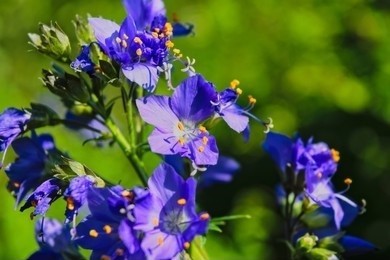Polemoniaceae Plant Tissue Culture
 The blue flowering plants of Polemoniaceae
The blue flowering plants of Polemoniaceae
Just because a plant is unexplored does not mean it is
useless, rather it may hold great and valuable value.
Polemoniaceae plants are mostly perennial herbs that grow in temperate zones of Asia and Europe, and also in North America, mostly on grassy mountain slopes, under sparse forests in valleys, roadside thickets, or wetlands near streams at altitudes of 1,000 m to 3,700 m. This family has a long flowering period and beautiful foliage, which makes it a good flowering herb and is still mostly in a semi-wild state.
Polemoniaceae plants have a therapeutic effect on cholesterol atherosclerosis in some animals, causing a reduction in the adhesion of lipids to the skin, arteries, liver, cornea, and other internal organs. Polemoniaceae plants enable the timely excretion of cholesterol accumulated in the cells, which acts as a lipid-lowering agent.
The propagation of Polemoniaceae plants is mainly by tiller propagation, which is slow, seedlings are not neat, and the commercial value is not high. Even if tissue culture is used to propagate in some cases, the differentiation multiplier is very low, the rooting rate is not high, and the number of roots is small due to the unsuitable medium formula used, so the quality of seedlings is not high and cannot meet the market demand.
Tissue culture service
Taking into account the current situation, Lifeasible configured clear solutions for the most suitable media formulations and culture procedures for different culture stages of different Polemoniaceae plant explants. While maintaining the excellent traits of the original plants, our tissue culture fast breeding is an effective way to realize the factory nursery of Polemoniaceae plants and preserve the germplasm resources, and we hope to develop more of these plants in a semi-wild state to provide new materials for research and production.
One of the ways of tissue culture of Polemoniaceae plants

- Selection of explants (related to the target material)
The selection of explants is very important for the tissue culture of plants. Exosomes of different ages, genotypes, and sites differ in their response to culture and propagation. For the selection of explants, we recommend that you prefer parts that have little effect on the ornamental properties of the plant, such as leaves, as explants for healing tissue induction.
- Exosome sterilization
In tissue culture, the commonly used disinfectants are HgCl2, NaClO, KMnO4, etc. We mostly choose NaClO as the disinfectant because it is easy to clean and has no pollution to the environment.
- Plant hormone ratios
The type and concentration of plant hormones have a great influence on the induction of exosome healing tissue, and the hormone induction effect is different for different genotypes of plants, so we have to optimize the hormone type and concentration ratio for each plant before formal culture to achieve the best culture effect.
You want to sign a confidentiality agreement.
You have a specific plant species for your experimental needs.
You have a reliable and relevant cooperation project to discuss.
You are very interested in our project or have any questions.
You need an updated and detailed quotation.
For research or industrial use.

 The blue flowering plants of Polemoniaceae
The blue flowering plants of Polemoniaceae

